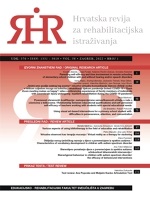Povezanost obrazovnih kvalifikacija i samopercipirane samoefikasnosti učitelja u radu s učenicima s teškoćama
Relationship between educational qualifications and self-perceived self-efficacy of teachers working with students with special educational needs
Author(s): Vanja MarkovićSubject(s): School education, Inclusive Education / Inclusion, Pedagogy
Published by: Sveučilište u Zagrebu, Edukacijsko-rehabilitacijski fakultet
Keywords: students with special educational needs; teacher self-efficacy; initial teacher education; in-service teacher training; inclusive education;
Summary/Abstract: This paper investigates the relationship between factors related to the educational qualifications of teachers who work with students with special educational needs and their self-perceived self-efficacy. The aim of this study was to define the latent structure of the characteristics associated with the educational background/qualifications of teachers who work with students with special educational needs based both on their initial education, as well as in-service training programs. We conducted a survey of 177 teachers from Istria County in Croatia. The self-efficacy subscale for inclusive teaching, which is an integral part of the Self-Efficacy for Inclusive Practice Questionnaire, was used as a measuring instrument. Data were analysed using one-way and multivariate analysis of variance and discriminant analyses. Our results indicate statistically significant differences between groups of teachers in their self-perceived self-efficacy for inclusive teaching based on differences in their initial education and participation in in-service training programs. These findings reveal that teachers who attended three or more courses aimed at working with students with special educational needs showed the highest level of self-efficacy for inclusive practices. Similarly, teachers who attended 20 or more hours of in-service training programs aimed at working with students with special educational needs had higher levels of self-efficacy for inclusive practices than those who attended up to 20 hours of such training programs or no training at all. Based on the discriminant analyses, we found two discriminant functions that significantly differentiate respondents in terms of the number of courses related to teaching students with special educational needs that they attended during their initial education, as well as the number of hours of in-service training programs attended.
Journal: Hrvatska revija za rehabilitacijska istrazivanja
- Issue Year: 58/2022
- Issue No: 1
- Page Range: 50-72
- Page Count: 23
- Language: English, Croatian

